

Antarctique: température et CO2 ont augmenté simultanément par le passé. Arctic Ice Melt Could Mean More Extreme Winters For U.S. And Europe. From Climate Central: The record loss of Arctic sea ice this summer will echo throughout the weather patterns affecting the U.S. and Europe this winter, climate scientists said on Wednesday, since added heat in the Arctic influences the jet stream and may make extreme weather and climate events more likely.
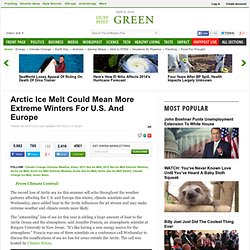
The “astounding” loss of sea ice this year is adding a huge amount of heat to the Arctic Ocean and the atmosphere, said Jennifer Francis, an atmospheric scientist at Rutgers University in New Jersey. “It’s like having a new energy source for the atmosphere.” Francis was one of three scientists on a conference call Wednesday to discuss the ramifications of sea ice loss for areas outside the Arctic. The call was hosted by Climate Nexus. The extent of Arctic sea ice on Aug. 26, 2012, the day the sea ice dipped to its smallest extent ever recorded in more than three decades of satellite measurements. The loss of sea ice initiates a feedback loop known as Arctic amplification. Arctic Warming Favors Extreme, Prolonged Weather Events 'Such As Drought, Flooding, Cold Spells And Heat Waves' By Climate Guest Contributor "Arctic Warming Favors Extreme, Prolonged Weather Events ‘Such As Drought, Flooding, Cold Spells And Heat Waves’" by Andrew Freedman, reposted from Climate Central By showing that Arctic climate change is no longer just a problem for the polar bear, a new study may finally dispel the view that what happens in the Arctic, stays in the Arctic.
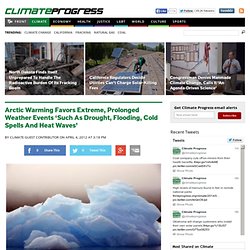
The study, by Jennifer Francis of Rutgers University and Stephen Vavrus of the University of Wisconsin-Madison, ties rapid Arctic climate change to high-impact, extreme weather events in the U.S. and Europe. The study shows that by changing the temperature balance between the Arctic and mid-latitudes, rapid Arctic warming is altering the course of the jet stream, which steers weather systems from west to east around the hemisphere. The jet stream, the study says, is becoming “wavier,” with steeper troughs and higher ridges. The strong area of high pressure shunted the jet stream far north into Canada. Arctic Warming Favors Extreme, Prolonged Weather Events 'Such As Drought, Flooding, Cold Spells And Heat Waves' En Antarctique, la fonte des glaces dix fois plus rapide. Finding heart in the melting Arctic. The record has already been broken – but it is about to be shattered.
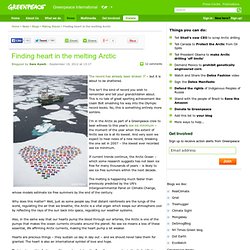
This isn't the kind of record you wish to remember and tell your grandchildren about. This is no tale of great sporting achievement like Usain Bolt smashing his way into the Olympic record books. Genetics of Arctic plants under serious threat from climate change, study says. A new EU study by a team of Austrian, French and Norwegian researchers has found that rising temperatures as a result of climate change will have differing genetic consequences within single Arctic plant species.
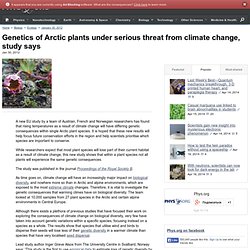
It is hoped that these new results will help focus future conservation efforts in the region and help scientists prioritise which species are important to conserve. While researchers expect that most plant species will lose part of their current habitat as a result of climate change, this new study shows that within a plant species not all plants will experience the same genetic consequences. The study was published in the journal Proceedings of the Royal Society B. High Arctic Warmest In 1,800 Years: 'The Medieval Warm Period Was Not As Uniformly Warm As We Once Thought' By Climate Guest Contributor on September 29, 2012 at 12:30 pm "High Arctic Warmest In 1,800 Years: ‘The Medieval Warm Period Was Not As Uniformly Warm As We Once Thought’" A “seminal” 2009 study in Science of Arctic temperatures found that human-caused warming had overtaken 2,000 years of natural cooling (see Figure).

A new study of the high Arctic provides further evidence for that conclusion. Story via Columbia University. Ice records fall at both poles - Embedded code. Le réchauffement plus rapide que ce qu'on pensait en Antarctique occidental. Photographer Daniel Beltrá on his Greenpeace mission to the Arctic – audio slideshow. 100 milliards de tonnes de glace en moins au Groenland.
Bédière sur l’inlandsis groenlandais, près de Nordlit Sermiat, Groenland (61°05’ N – 46°27’ O). © Yann Arthus-Bertrand/Altitude Il y a encore quelques années la situation du Groenland semblait stable.
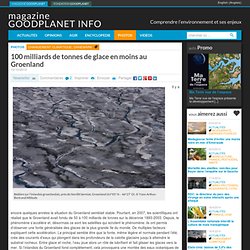
Pourtant, en 2007, les scientifiques ont réalisé que le Groenland avait fondu de 50 à 100 milliards de tonnes sur la décennie 1993-2003. Depuis, le phénomène s’accélère et, désormais ce sont les satellites qui scrutent le phénomène: ils ont permis d’observer une fonte généralisée des glaces de la plus grande île du monde. Porter des milliers de voix à Kiruna pour l'Arctique. La réunion du Conseil de l’Arctique s’est déroulée hier à Kiruna, en Suède. Cette réunion regroupe les membres permanents de cette organisation intergouvernementale, riverains de l’Arctique: Canada, Danemark, États-Unis, Finlande, Islande, Norvège, Russie et Suède ; et des représentants des peuples autochtones ainsi que les six pays observateurs, dont la France.
Ce rendez-vous était important, pour de nombreuses raisons. D’abord car la réunion rassemble les décideurs de l’avenir du cercle polaire, ceux qui ont l’avenir de ce territoire entre leurs mains … Une occasion inespérée de leur parler à tous ! Deuxième raison : c’est le Canada qui a endossé cette année la présidence tournante du Conseil, et que son parti-pris en faveur de l’industrie pétrolière ne présage rien de bon.
Autant de bonnes raisons donc, pour que nous soyons présents et surtout actifs ! Le message au Canada Votre message aux délégués ! Il y a urgence pour l’Arctique ! < Toutes les actualités de la campagne Save The Arctic. Video Explains How Loss Of Arctic Ice Weakens Jet Stream, Amplifies Extreme Weather. By Joe Romm "Video Explains How Loss Of Arctic Ice Weakens Jet Stream, Amplifies Extreme Weather" We’ve written extensively about how how arctic ice loss is driving extreme weather.

Jennifer A. Francis of Rutgers University’s Institute of Marine and Coastal Sciences has been at the forefront of this research. She appears in many videos explaining the connection between climate change and extreme weather (see recent 40 minute video here). Here’s a short version aimed at a very general audience: Related Posts: